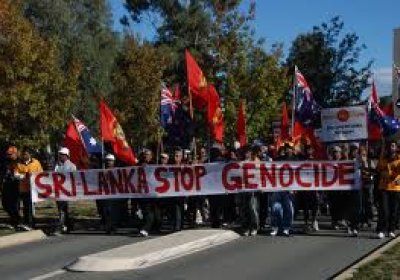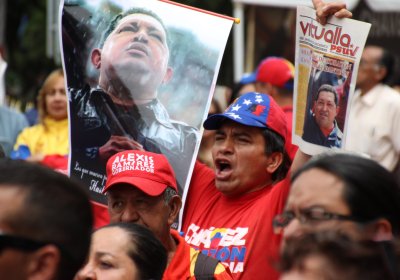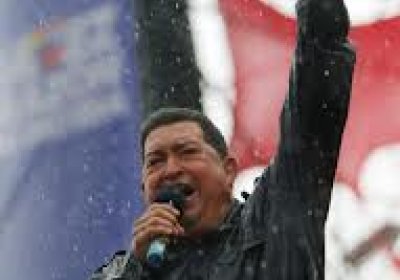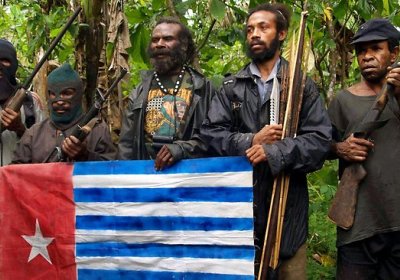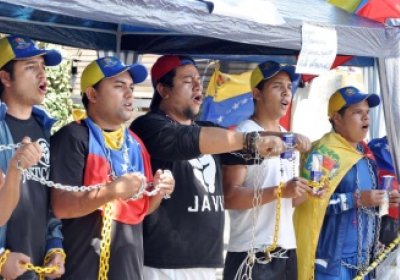The Real News looks at the gains made by Palestinian prisoners' hunger strikes against Israel.
National liberation
It takes more than an individual to upset the international chessboard as dramatically as it has been in the past decade.
Forces unleashed by the logic of capitalism have drawn a new geopolitical map, in which the United States has lost its former place as the world's centre of gravity and the ultimate arbiter of the key issues of the economy, politics and war.
Yet, though changes of such magnitude were obviously not the work of one person, the late Venezuelan president Hugo Chavez’s hallmark was a profound intuition of this impending change.
The Victoria Refugee Action Collective held a forum on March 20 called “Persecuted in Sri Lanka, detained in Australia: the plight of Tamil refugees”.
Former journalist Trevor Grant said the Australian public has been taught to be fearful of refugees. The language used to speak about them — including terms such as “illegal” and “border protection” — is designed to create fear.
Grant, who is active in the Tamil Refugee Council, spoke of the use of torture and rape by Sri Lankan government forces against Tamils.
Hundreds of people rallied outside parliament house in Canberra on March 13 to demand action for the war crimes of Sri Lankan President, Mahinda Rajapaksa.
The rally was organised by Campaign for Tamil Justice, who are calling for an independent investigation into allegations by a UN panel of Sri Lankan military war crimes and crimes against humanity.
Campaign spokesperson Trevor Grant said: “The UN Human Rights Commission is meeting right now on Sri Lanka and the word is that there will be another insipid resolution issued, with support from Australia.
Hugo Chavez cut a wide swath on the international scene, more than that of any other leader in the recent history of Latin America, putting forth a vision of a world based on equitable relations among nations and peoples.
His rise to hemispheric prominence began at the third Summit of the Americas in April 2001 in Quebec, Canada when the newly inaugurated George W. Bush attempted to ram through the Free Trade Area of the Americas that was to extend from the Arctic Circle to Tierra del Fuego in South America.
When Venezuelans return to the polls in new presidential elections on April 14, analysts are predicting a decisive win for Nicolas Maduro, the candidate of the United Socialist Party of Venezuela (PSUV).
In December, the late president Hugo Chavez urged his supporters to back Maduro as PSUV candidate should Chavez’s worsening health prevent him from fulfilling his presidential term.
Under the Venezuelan constitution, new elections must be held within 30 days of the resignation or death of the president.
The huge, genuine and spontaneous outpouring of grief that has enveloped Venezuela in the days since Hugo Chavez passed away on March 5 show that the late Venezuelan president was no ordinary politician.
Hundreds of thousands of people flooded the streets to accompany Chavez's coffin on its way from the hospital where he died to the military academy where his body is currently lying in state, clad in the red that symbolises the Bolivarian revolution and chanting “the people united will never be defeated”.
We have known for some time that the death of Venezuela's socialist President Hugo Chavez was probably coming soon. But that did not make it any easier for many of us when it came.
Cynics, and worse, have started to pour scorn on the mass grief in Venezuela and around the world.
Chavez wasn't just a leader of a revolution in a faraway Latin American country. He was a hero and champion of people all around the world precisely because he broke so radically from the ugly mould of most 21st century politicians.
In a raw emotional outpouring, hundreds of thousands of Venezuelans walk along side the coffin of President Hugo Chavez. Leaders and people across Latin America have joined the mourning.
The Australian Socialist Alliance released this statement on March 6.
* * *
The Socialist Alliance in Australia expresses its deepest sympathies with the people and government of Venezuela on the death of Companero Hugo Chavez Frias on March 5. His passing is a huge loss for all peoples, across Latin America and the globe, struggling for a world free of inequality, exploitation and oppression.
Eight Indonesian soldiers were killed on February 21 in West Papua. The attacks were claimed by the armed wing of the Free Papua Movement (TPN-OPM).
The attacks came after a series of violent crackdowns by Indonesian authorities on a growing movement of peaceful protest by Papuans calling for end to Indonesian occupation and for self-determination.
In the first attack, a military post in Tingginambut, Puncak Jaya, was raided. One soldier was killed and another injured.
As Washington ramps up anti-Venezuelan rhetoric, its proxies in the South American nation appear to be following a US-backed plan to bring down the democratically elected government.
On February 15, opposition students began a four-day protest outside the Cuban Embassy.
The group of about students allegedly assaulted an elderly passer-by. In the past, members of the same group have allegedly been involved in blockading roads and burning tires during protests in the city of Merida.
- Previous page
- Page 109
- Next page


